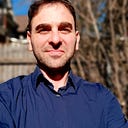Member-only story
Praising God on the Train Tracks

While on a trip to Germany and Poland with FASPE (Fellowships at Auschwitz for the Study of Professional Ethics) in 2016, I found myself praising God in the sweetness of the afternoon sun while standing on the Grunewald station train tracks from which Berlin Jews were sent to death camps during the Holocaust. The following is an attempt to understand that strangely positive moment in the midst of darkness.
It was our third stop at a Holocaust-related site on that long, heavy day. First we had been to the town of Brandenburg an der Havel, where some of the first gas chambers were built, and 10,000 mentally and physically challenged people were killed, along with a number of homosexuals and others deemed “feeble-minded.” Next, we had spent time at the House of the Wannsee Conference, where the details of the so-called “Final Solution” were ironed out. And finally, we visited the Grunewald train station, from which the Jews of Berlin were sent to be murdered. It was late afternoon when we got to the train tracks. The summer heat was intense and fatigue had set in. We walked down the tracks to the dozens of bronze plaques set into the platform, which recorded the transport dates, the number of Jews deported, and train destinations. As I walked, I felt myself pulled toward the magnetic force of the Israeli flags at the edge of the tracks, probably left by a group of recent Israeli visitors. Bright blue and white cutting through the grayness, draped proudly on the tracks, along with stones and dried out flowers. I touched the soft fabric with love, a love that I have not felt in a long time toward this symbol of nationalism, human shallowness, and greed. This symbol of the innocence of my childhood. This symbol of the state of Israel, which sends its children here to wrap themselves in this cloth and go back home to manage the cruelty over Palestinians with a gun. And yet, I needed to touch it. It felt cool and soft against my skin.

Soon I was joined by another Seminary Fellow, Emily, and one of the Seminary faculty, Rabbi Jim. So there we were by the flags, one rabbi and two rabbis in the making, and it was time for Mincha, the afternoon service. So far on our trip, we hadn’t…
